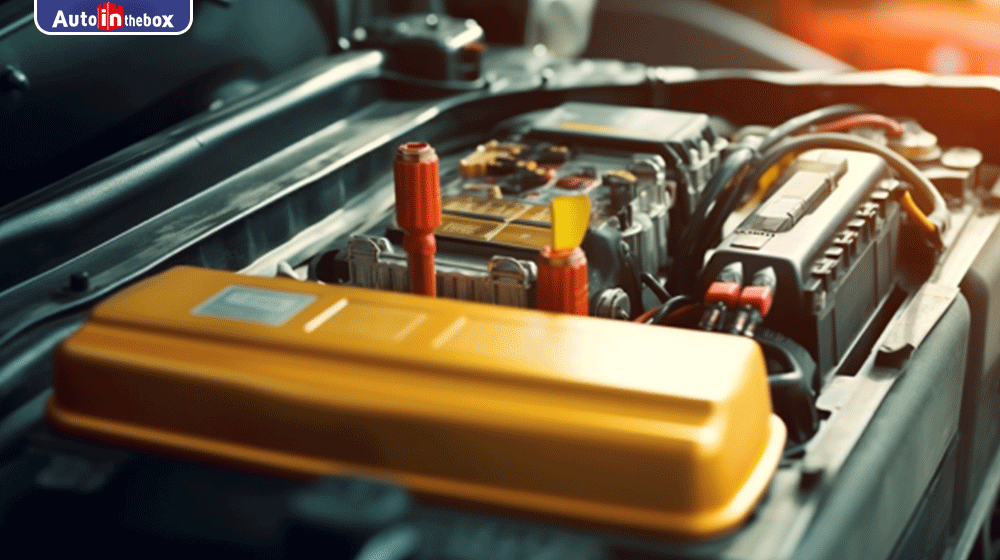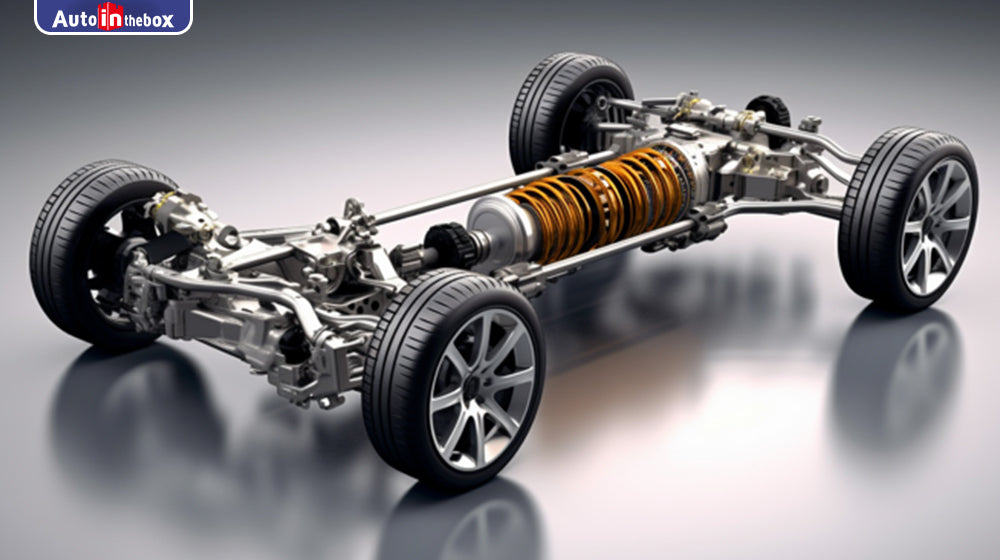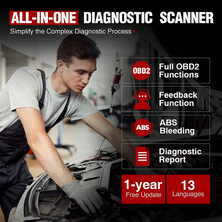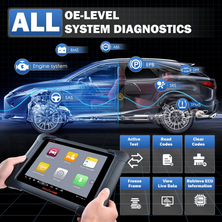
How to Repair Car Battery Won't Charge?
Car Battery Won't Charge Summary:
When a car battery fails to charge, it can indicate various issues. The problem may lie in the storm, such as loose connections, terminal corrosion, or a completely discharged battery. Additionally, the alternator, responsible for charging the battery while the engine is running, could malfunction. Other potential causes include problems with the charging system, such as blown fuses, damaged wires, or a faulty voltage regulator. Troubleshooting these components and seeking professional assistance can help identify and resolve the issue, ensuring the car battery charges properly.
Recommended 2023 top car diagnostic tool: Autel Ultra lite,Autel MP808S-TS,Autel MS906BT,Autel MK906BT,Launch X431V+
Car Battery Won't Charge - Possible Causes:
Dead or Completely Discharged Battery: The battery may be drained of power due to extended periods of inactivity or a faulty electrical component, preventing it from accepting a charge.
Faulty Battery Connections: Corrosion or loose connections at the battery terminals can disrupt the flow of electricity, preventing the battery from charging correctly.
Malfunctioning Alternator: The alternator charges the battery while the engine is running. A faulty alternator can fail to generate sufficient power to charge the battery.
Defective Voltage Regulator: The voltage regulator regulates the battery's charging rate. If it malfunctions, it can overcharge or undercharge the battery, leading to charging issues.
Damaged Charging System Components: Issues such as blown fuses, damaged wiring, or faulty relays in the charging system can interrupt the charging process and result in a battery that won't charge.
Aging or Failed Battery: Car batteries can lose their capacity to hold a charge or fail, requiring replacement.
Diagnosing the specific cause of the battery not charging is essential to determine the appropriate repair or replacement needed to resolve the issue.
Repairing a Car Battery, That Won't Charge:
Check battery connections:
a. Inspect the battery terminals for corrosion or lose connections.
b. Clean the terminals using a wire brush and a baking soda and water solution.
c. Ensure the connections are tight and secure.
Test the battery:
a. Use a multimeter to measure the battery voltage.
b. The battery may be fully discharged if the voltage is extremely low or zero.
c. Jump-start the battery or use a battery charger to recharge it.
Inspect the alternator:
a. Check the alternator belt for tension and signs of wear.
b. Test the alternator's output using a voltmeter or have it tested at an auto repair shop.
Check the charging system:
a. Inspect the fuses and relays associated with the charging system.
b. Examine the wiring for any damage or lose connections.
c. Consult a professional to diagnose and repair any issues with the charging system.
Check the voltage regulator:
a. The voltage regulator regulates the charging rate of the battery.
b. If the regulator is faulty, it may prevent the battery from charging correctly.
c. Replace the voltage regulator if necessary.
Seek professional assistance:
a. If the above steps do not resolve the issue, it is recommended to consult a qualified mechanic.
b. A professional can perform advanced diagnostics and repairs to fix the car battery charging problem.
Following these steps and addressing the potential causes can increase the chances of successfully repairing a car battery that won't charge.
Preventing a Car Battery from Not Charging:
- Regular battery maintenance: Periodically inspect and maintain the battery per the manufacturer's recommendations. Clean the battery terminals, ensure tight connections, and remove any corrosion.
- Avoid long periods of inactivity: When the vehicle is not in use for an extended period, try to avoid fully discharging the battery. Consider using a battery maintainer or charger to keep the battery charged.
- Proper usage of electronic devices: Avoid excessive use of electronic devices in the vehicle, such as audio systems or car chargers, as they can put additional strain on the battery.
- Drive time and distance: Whenever possible, allow the vehicle's engine to run sufficiently to ensure the alternator can adequately charge the battery.
- Maintain the generator and charging system: Regularly inspect and maintain the alternator and charging system. This includes checking the belt's condition, ensuring tight connections, and cleaning or replacing faulty components.
- Keep the battery healthy: Replace it promptly when it reaches the end of its lifespan or shows signs of failure. Avoid using outdated or low-quality batteries.
- Ensure proper installation and connections: When replacing the battery, alternator, or other charging system components, ensure they are installed correctly, and the links are secure. Follow the manufacturer's guidelines and specifications.
By implementing these preventive measures, you can significantly reduce the risk of a car battery not charging, extend the battery's lifespan, and ensure the reliability of your vehicle.
The Consequences of a Car Battery Not Charging:
- Inability to start the vehicle: A dead or uncharged battery means the car may not start at all, leaving you stranded and unable to use the vehicle until the battery is charged or replaced.
- Disruption of daily routines: A car battery that won't charge can cause significant inconvenience and disruption to your daily routines, mainly if you rely on the vehicle for commuting, running errands, or other essential activities.
- Unreliable transportation: A vehicle with a faulty battery charging system becomes unreliable, with a higher risk of the battery dying while driving. This can lead to unexpected breakdowns and leave you stranded in unsafe or inconvenient locations.
- Diminished electrical functionality: The battery powers various electrical components in the vehicle, including lights, infotainment systems, and power accessories. When the battery is not charged, these systems may not function properly or experience reduced performance.
- Increased strain on other components: When the battery is not charging, other features like the alternator and voltage regulator may be forced to compensate, potentially leading to premature failure. This can result in expensive repairs and replacements.
- Reduced battery lifespan: Continuously operating a car battery in a discharged state can significantly shorten its lifespan. Repeated deep discharges can damage the battery cells and diminish their capacity to hold a charge effectively.
- Higher maintenance and repair costs: Dealing with a car battery that won't charge can increase maintenance and repair expenses. Diagnosing and fixing the underlying issues may require professional assistance and replacement of components.
It is crucial to address charging issues promptly to avoid these consequences and maintain the reliability and functionality of your vehicle.
The Importance of a Car Battery:
A car battery plays a critical role in the overall functioning of a vehicle. Here are the key reasons highlighting its importance:
Powering the vehicle: The car battery provides the initial power needed to start the engine. It supplies electrical energy to the starter motor, allowing the engine to ignite and initiate the combustion process.
Electrical system support: The battery is a stable power source for the vehicle's electrical systems and components. It provides energy to the lights, audio systems, infotainment systems, power windows, and other electrical accessories, enhancing overall comfort and convenience while driving.
Backup power source: In case of alternator failure or when the engine is not running, the battery acts as a backup power source, ensuring essential electrical functions can still operate until the vehicle can be serviced.
Voltage stabilization: The battery helps stabilize the voltage in the vehicle's electrical system, ensuring consistent and reliable operation of various components. It prevents voltage spikes and fluctuations that could damage sensitive electronic equipment.
Emergencies: A fully charged and adequately functioning battery is crucial, as it powers critical systems like the lights and horn. This enables visibility and communication with other drivers, enhancing safety on the road.
Overall vehicle performance: A well-maintained battery contributes to the vehicle's overall performance. It ensures efficient starting of the engine, consistent electrical system operation, and proper functioning of vehicle systems, improving reliability and drivability.
Peace of mind: A reliable and properly maintained battery provides peace of mind to the driver, knowing that the vehicle can start without issues and that essential electrical functions will operate as intended.
Given its essential role, regular maintenance, timely replacement, and addressing any charging issues are critical for ensuring a functional and dependable car battery.
Older Post
 Newer Post
Newer Post

Why does my car radiator have noise?

Car Chassis or suspension system is unstable?How to fix










